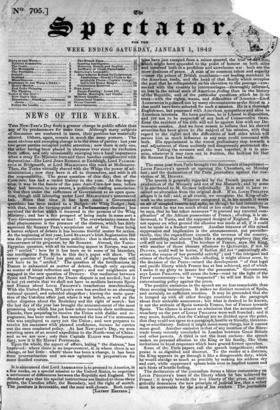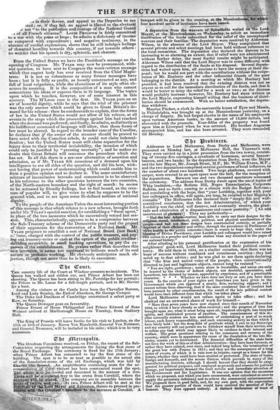The same post from Paris brought two documents of importance—
Louis PHILIPPE'S speech on opening the Chambers, on Monday last ; and the declaration of the Paris journalists against the con- viction of M. DUPOTY.
The speech is generally regarded by the French papers as the production of the Ministry and not of the Monarch ; and by some it is attributed to M. GUIZOT individually. It is said to have re- ceived no alteration from the original draft. If so, Louis PHILIPPE adopts it in full ; and, at all events, we recognize the King-of-all- work as the utterer. Whoever composed it, in his mouth it wears an air of mingled reserve and spite, as though he had intentions in store which he was too much afraid or too crafty to disclose. Thus he says, that be has taken measures "to prevent any external com- plication" of the African possessions of France; • alluding, it is un- derstood, to Tunis, and the supposed designs of England. It does not appear on what ground the allusion was made at all, if it could not be made in a franker manner. Another instance of this mixed suppression and implication is the announcement, put parenthe- tically, that the expenditure exceeds the revenue of the country, with something that almost looks like a sneering prophecy that the evil will not be mended. The burdens of France, says the King,
with another of those obscure allusions to QUENISSET, if nut to
DUPOTY, could well be borne, if faction did not " unceasingly ob- struct the course of her powerful activity"; and "the intrigues and
crimes of the factious," he adds—alluding, it might almost seem, to
the decision of the Peers—retard the development " of that legal and pacific liberty which France has at last achieved, and of which I make it my glory to insure her the possession." Government, says Lours PHILIPPE, will cause the laws—read by the light of the Peers' commentary—to be " respected" : he will not flinch in his exterminating policy against the press. The positive omissions in the speech are no less remarkable than these seeming insinuations. It makes no distinct mention of Spain, and certainly no sufficient mention. It may be pretended that she is lumped up with all other foreign countries in the paragraph about their amicable assurances; but what is desired to be known, is not the attitude of Spain towards France, but of France towards Spain. The silence is almost an admission that the accusations of treachery on the part of Louis PHILIPPE were well founded ; and it may mean, besides, hat dm Cabinet are so divided upon the point, that they could not agree to a paragraph, hostile or friendly, threaten- ing or conciliatory. Indeed it might mean many things, but it cannot mean good. Another omission is that of any mention of the Slave- trade treaty recently concluded in London between Great Britain and other powers. A third is not the least curious : the speech makes no personal allusion to the King or his family, like those invitations to loyal responses which have graced former speeches. Some of the Paris papers call the speech insignificant; others praise is as dignified and discreet. To the reader at a distance, the King appears to go through it like a disagreeable duty, which he would abridge as much as possible by making his address dry and curt, while suppressed spleen boils over in implied taunts and see hints of hostile feeling. The declaration of the journalists forms a bitter commentary on Louis PHILIPPE'S boast of the liberty which he has achieved for France : it deeply bewails the lost liberty of the press, and ener- getically denounces the new principle of judicial law, that a writer must be answerable for the acts of his readers. The journalists
..s in their favour, and appeal to the Deputies to see ated; or, if they fail, an appeal is hinted to the electoral a not "to the patriotism and courage of the National Guard a of all French citizens." LOUIS Pniurrs is fairly committed to a war with the press at large ; he admits a deficiency of income as compared with expenditure ; and negative testimony, in the absence of cordial expressions, shows that he still indulges feelings of thwarted hostility towards this country, if not towards others : no wonder that his speech is dry, splenetic, and obscure.
































 Previous page
Previous page